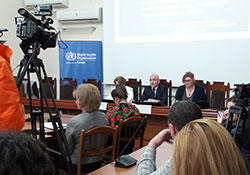First HBSC national report in Republic of Moldova

WHO
The results of the first national Health Behaviour in School-aged Children (HBSC) report "Behavioural and social determinants of adolescent health" were presented on 30 March 2016 in Chisinau, during a press conference organized by the Ministry of Health, the WHO Country Office in the Republic of Moldova and the national HBSC research team.
The report presents findings from the 2014 HBSC survey on the demographic and social determinants of health of 6642 young people from the Republic of Moldova. The study surveyed 11-, 13- and 15-year-old school-aged children from 118 education facilities (90 secondary general/high schools and 38 colleges/vocational schools). In contrast to other countries in the HBSC network, the Moldovan report included 17-year-olds.
The Deputy Minister of Health, Liliana Iașan, said, "The HBSC report represents a set of evidence on school-aged children's health, well-being, health behaviours and social context and will help us, based on trends, to understand better the needs of the young generation, and will contribute to the improvement of national youth policies and the provision of targeted services."
Main findings
- Most adolescent respondents (77.4%) report their health status as good or excellent. However, about one fifth (22.6%) report their health as fair or poor.
- Although most adolescents (67%) have a body mass index within the normal range, every 8th teenager has excess body weight, and every 5th teenager has a body mass deficit.
- Girls are more likely to believe that they are overweight and this increases with age from 39% at 11 years to 48% at 17 years. Girls (16.4%) diet twice as often as boys (7.2%).
- Only 6 in 10 respondents indicate that they eat breakfast every weekday and every 10th skips breakfast.
- Girls (13.1%) skip breakfast during the week more often than boys (8.4%), and this behaviour worsens with age; 17-year-olds (15.8%) have no breakfast 2.5 times more often than 11-year-olds (6.5%).
- Only one third of respondents (33%) eat fruits daily and one fifth (20.9%) eat fruits once a week or less.
- The majority of young people (89.9%) brush their teeth once a day and one in two (50%) brush their teeth more often.
- Only 23% of adolescents meet a minimum physical activity level of 60 minutes a day, and 4.6% have no daily physical activity.
- 52% of young people spend 2 hours or more daily on screen time, socializing and studying, during weekdays, and the figure rises to 60.4% during weekends.
The survey was carried out by the national HBSC research team under the Healthy Generation – Youth-friendly Health Services project implemented by the Health for Youth Association, in partnership with the Neovita Youth-friendly Health Center. The Swiss Agency for Development and Cooperation provided financial support and WHO provided technical assistance. The Ministry of Health, the State University of Medicine and Pharmacy "Nicolae Testemitanu" and the Ministry of Education provided organizational support.
About HBSC
The HBSC survey covers diverse aspects of adolescent health and social behaviour. Adolescents described their:
- social context (relations with family, peers and school)
- health outcomes (subjective health, injuries, obesity and mental health)
- health behaviour (patterns of eating, tooth brushing and physical activity)
- risk behaviours (use of tobacco, alcohol and cannabis; sexual behaviour; fighting; and bullying).
A group of researchers from the Republic of Moldova, with the support of WHO, joined the HBSC network in October 2013 (official submission of the application and vote in the Assembly of the HBSC network) and became the 44th member country.



